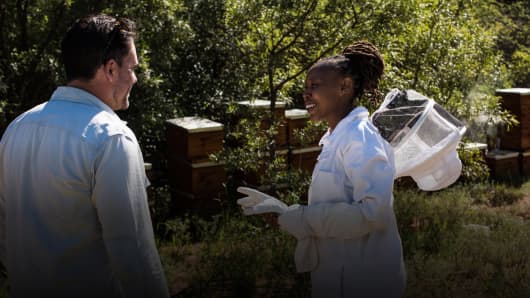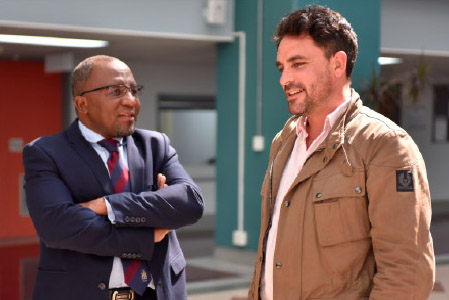Setting the sustainability agenda
Where great
minds meet:
South Africa

In the third of a four-part series, author and explorer Levison Wood discovers how South Africa’s natural landscape lends itself to new sustainability partnerships.
Part III: South Africa — setting the sustainability agenda
As the global business community works towards meeting the UN’s 17 Sustainable Development Goals by 2030, many agendas now focus on kick-starting the next decade of sustainable projects. According to the UN’s 2019 progress report, reducing global hunger still remains a top priority.
British explorer and author Levison Wood has visited over 100 countries and witnessed how regions collaborate to meet this goal. So why visit South Africa and what does collaboration in sustainability look like?
South Africa: A source of growth
Levison explains: “South Africa is nature at its rawest. Its rich history, vast landscape and fertile territory mean that collaboration in sectors like sustainable agriculture are flourishing.” Worldbank.org reports that agriculture accounts for one-third of global gross domestic product (GDP). Growth in this sector is two to four times more effective in raising incomes than other sectors. According to Global AgInvesting, Africa holds 60% of the world’s uncultivated arable land — and only 8% is under managed development. In 2019, Akinwumi Adesina, president of African Development Bank, predicted that Africa’s future billionaires will be producers or farmers. The potential for wider agricultural investment is significant — and Levison is keen to meet the South African producers driving innovation in unique ways.
“South Africa’s natural landscape enables sustainable agriculture to flourish.”
South Africa’s sustainability scene
Mokgadi Mabela is founder and CEO of Native Nosi, one of South Africa’s largest honey producers. With over 25 hives and up to 60,000 bees per colony, Native Nosi supplies natural honey to partners across retail, health care, pharma, tech, beauty and hospitality. Levison travels to the firm’s Pretoria headquarters — a bee farm set in acres of unspoiled habitat. He meets Mokgadi who is a third-generation beekeeper.
Mokgadi reveals “My role is essentially to ensure the bees produce honey in an optimum environment. Controlled pollination and managed honey bees are very valuable to world economies. Many sectors rely on honey bee cross pollination to grow food groups and develop new end products. Without bees, we’d see a drastic reduction of goods supply and an increase in prices.”

Honey bees in agriculture are increasing in value and their benefit to humans cannot be overstated. Mokgadi explains “It’s why global bee conferences including Apimondia are thriving. It’s a place where tech disruptors, scientists, engineers, producers and economists brainstorm on how to create a prosperous future for bees — which means safeguarding our future too. It would be great if Apimondia came to South Africa.”
As Levison prepares to inspect the highly productive bee hives, Mokgadi shares the secrets of her success: “We do nothing to our honey and its uses are virtually limitless. We regularly cook fresh dishes with honey at the African Beer Emporium — a creative collective space. I also innovate with different partners and suppliers across the entire region. We meet at the V&A Waterfront in Cape Town; at Pretoria’s creative workshops, in restaurants and pop-up spaces. South Africa’s natural resources and inventive people are extremely busy tackling sustainable solutions together.”

A sustainable set up
Amanda Kotze-Nhlapo, chief convention bureau officer of South African National Convention Bureau (SANCB), observes a new trend in the way innovation unfolds. “Networking and conferences do not have to involve sitting in a convention center. ‘Meeting Design’ is evolving. Our diverse spaces, centers and locations produce diverse thinking, creativity and ideas. Business visitors can meet, create, solve and then relax, all in one space. There’s a real movement around agriculture and food. We’re producing authentic ingredients and promoting extremely healthy living.”
“The concept of ‘Meeting Design’ is evolving. We no longer need to sit in one space. South Africa’s diverse meeting spaces, centers and locations result in diverse thinking, creativity and ideas.”

Fine dining restaurant Riverine Rabbit, Cape Town, advocates sustainability and authenticity. Head chef and founder Ash Heeger, who trained with Michelin chefs including Heston Blumenthal, is on a mission to work with local suppliers and create uniquely authentic South African dishes. Heeger explains “we take a humble vegetable - for instance the leek - and blend a myriad of local ingredients to create a dish full of flavor. We’re taking fine dining to the next level. In the past five years, the food scene in South Africa has blossomed and we’re seeing a stream of locals and visitors enjoy outstanding food.”

One stop shop for sustainability
Levison moves from Pretoria to Zebula Golf Estate and Spa, Mabula, which offers fine dining, quad bike safari and leisure activities all under one roof. Set against a spectacularly untamed backdrop, Zebula’s quad safari experience is unique. During his ride, Levison photographs zebra, giraffe and impala all roaming free and thriving. According to Zebula game manager Gerson Mmboyi, “this is thanks to our long-term sustainable, educational and rehabilitation policy” — which is part of South Africa’s overall commitment to accelerating the UN’s sustainability agenda.
South Africa is a genuinely rich resource for investing in sustainable practices. Watch Levison’s full experience here:






